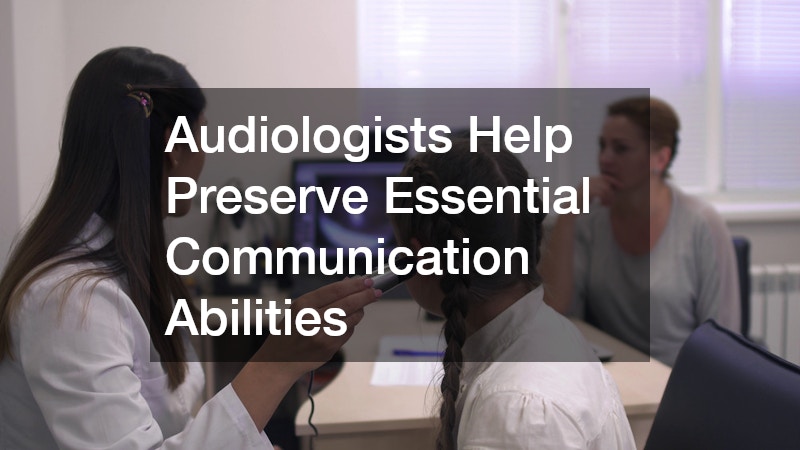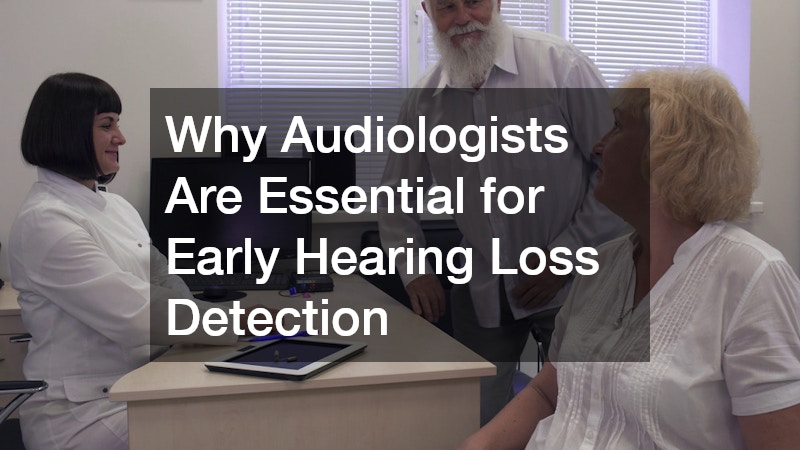Early detection of hearing loss is crucial in preserving quality of life, and audiologists play a pivotal role in this process. Their expertise in diagnosing and devising treatment plans ensures individuals receive the care needed to maintain and improve auditory health.
Hearing loss does not discriminate and can affect individuals at any stage of life, making regular check-ups with audiologists essential. Without timely interventions, individuals are at risk for complications in their personal and professional lives.
Audiologists provide comprehensive services that extend beyond diagnosis to include education, counseling, and tailored treatment, highlighting their indispensable role in health care. Their work is vital in preventing further damage and maintaining effective communication and language skills.
What is the role of an audiologist in diagnosing hearing loss?
Comprehensive Hearing Assessments
Audiologists use a variety of sophisticated tools and techniques to assess an individual’s hearing health. Through detailed evaluations, they can determine the degree and type of hearing loss a patient is experiencing.
The assessments often include pure-tone tests, speech recognition assessments, and tympanometry, each designed to pinpoint specific auditory issues. By utilizing these tools, audiologists are able to develop a clear understanding of a patient’s hearing capabilities.
These assessments are crucial in identifying hearing loss early, which may otherwise go unnoticed in its initial stages. For patients, understanding the full scope of their hearing abilities is the first step towards effective treatment.
Client Education and Counseling
Once diagnostics are complete, audiologists play an important role in educating clients about their condition. They explain test results thoroughly, ensuring clients understand the specifics of their hearing loss.
In addition to diagnostics, audiologists provide valuable counseling services, discussing potential treatment options and guiding patients through managing their condition. This support is instrumental in helping patients adapt to hearing changes and minimize their impact.
Education and counseling by audiologists empower patients, providing them with the knowledge to make informed decisions about their care. This approach fosters a collaborative relationship that enhances treatment outcomes.
Why is early detection of hearing loss critical?
Impacts on Language and Cognitive Development
In children, undetected hearing loss can severely impact language acquisition and cognitive development. Audiologists help mitigate these effects by recommending early interventions.
Early detection allows for the timely initiation of therapies and assistive technologies that support speech and language development. Hearing aids and cochlear implants, for example, can bridge the communication gap for children with hearing loss.
Audiologists are essential in monitoring developmental milestones and adapting interventions to ensure children with hearing loss reach their full potential. This proactive approach is crucial in preventing long-term educational and social challenges.
Prevention of Further Hearing Damage
Identifying hearing loss early can prevent its further deterioration, protecting an individual’s residual hearing. Audiologists implement management strategies to address the specific needs of their patients.
These strategies include recommending the use of hearing protection, lifestyle modifications, and ongoing monitoring. Through regular follow-ups, audiologists can adjust treatments to prevent additional auditory damage.
The fact remains that untreated hearing loss tends to worsen over time, often leading to social isolation and reduced quality of life. Audiologists are key in preventing these outcomes by promoting proactive management.
How do audiologists contribute to personalized treatment plans?
Tailored Hearing Solutions
Audiologists excel at creating personalized treatment plans that cater to the unique needs of each patient. This customization includes selecting and fitting hearing aids, cochlear implants, or other assistive devices.
By understanding the specific environments and challenges a patient faces, audiologists can fine-tune devices to optimize hearing. This tailored approach ensures higher satisfaction and effectiveness of the chosen solutions.
Moreover, customized treatment plans result in better compliance and engagement from patients, as they feel their individual needs are being addressed. This personalized care is vital in enhancing overall well-being and communication.
Continuous Monitoring and Adjustment
Post-treatment, audiologists provide continuous monitoring and adjustments to ensure optimal outcomes. This ongoing care is crucial for maintaining effective hearing solutions over the long term.
As a patient’s hearing needs evolve, audiologists make necessary adjustments to devices and treatment plans. Regular check-ups are integral in adapting to changes and addressing concerns promptly.
This continuous support reinforces the trust between patients and audiologists, fostering a collaborative approach to managing hearing health. The importance of this ongoing relationship cannot be overstated in ensuring consistent auditory health.
Audiologists play an essential role in the early detection and management of hearing loss, providing invaluable services that extend far beyond diagnostics. Their expertise is crucial in preventing further deterioration and ensuring effective communication and quality of life.
Through comprehensive assessments, personalized treatment, and ongoing support, audiologists empower individuals to take control of their hearing health. Their work underscores the importance of regular hearing check-ups and the vast benefits these professionals offer.
By consulting with audiologists, individuals at risk of hearing problems can proactively manage their auditory health, preventing long-term complications and promoting overall well-being. Audiologists are indispensable in maintaining the ability to connect and communicate with the world.


